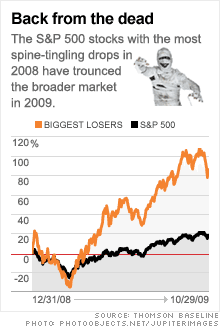GE, Verizon and Wal-Mart: Scary stocks
These blue chips are down in this year's up market. But it may make sense to buy some of the year's biggest losers. Many of 2008's tricks are 2009's treats.


NEW YORK (CNNMoney.com) -- Halloween is finally here. But many investors have been getting more treats than tricks for nearly eight months now.
The explosive rally in stocks from their early March lows has given a big boost to people's portfolios and 401(k) accounts. All the major market barometers are now up at least 10% this year.
Not all companies have participated in the fun, however. Several prominent blue chips, including General Electric (GE, Fortune 500), Eli Lilly (LLY, Fortune 500), Verizon (VZ, Fortune 500), Wal-Mart (WMT, Fortune 500) and Comcast (CMCSA, Fortune 500), are all down this year.
Their shareholders must feel like poor Charlie Brown, as their investing trick or treat bag is filled with rocks instead of tasty sweets.
But can these stocks, as well as other losers in 2009, bounce back and enjoy a solid 2010? It's possible. Some contrarian investors believe that the best stocks to buy at the start of any given year are the biggest laggards from the previous year.
Charles Carlson, the CEO of investment firm Horizon Investment Services, uses a strategy he calls the "worst-to-first" for stocks in the Dow Jones industrial average.
The strategy doesn't always work. If you bought last year's 10 worst Dow stocks, for example, your portfolio would be up just 9.2% compared to a 13.5% gain for the Dow as a whole. (That 9.2% increase assumes that, for some bizarre reason, you decided to stick with Motors Liquidation Company (MTLQQ) after GM went bankrupt and was delisted.)
But if you broaden out Carlson's approach, there does seem to be some merit to buying big losers with the hopes that they will turn around. To that end, the 47 companies in the S&P 500 that were down more than 70% in 2008 are up, on average, a staggering 86% so far this year.
Insurance giant Genworth Financial (GNW, Fortune 500), which was spun-off from GE a few years ago, plunged nearly 90% in 2008. The stock has soared more than 250% in 2009. Whole Foods Market (WFMI, Fortune 500), which lost more than three-quarters of its value last year, has skyrocketed 242% this year thanks to improving sales.
And Motorola (MOT, Fortune 500), which got crushed in 2008, falling 72%, has nearly doubled this year. Analysts are hopeful that some of the company's soon-to-be-released smartphones, such as the Cliq for T-Mobile and Droid for Verizon Wireless, can compete with the likes of Apple's (AAPL, Fortune 500) iPhone, Reseearch in Motion's (RIMM) BlackBerry and the Palm (PALM) Pre.
It just goes to show that companies whose stocks are left for dead can often rise from the grave like zombies in a horror movie. Quickly scanning the list of this year's poor performers, a few stand out as stocks that could enjoy a rebound in 2010.
Wal-Mart, for example, now looks extremely attractive, trading at less than 13 times earnings estimates for its next fiscal year. The company held up extremely well during the recession. So it seems that the only reason the stock's taking a hit this year is because investors have decided to flock back into other retailers that were beaten up a year ago.
Sooner of later, investors should realize that the company's steady growth deserves to be rewarded, not punished.
Likewise, one of the better performing banks of 2008, Paramus, N.J.-based Hudson City Bancorp (HCBK), isn't taking part in the bank stock renaissance of 2009. Shares are down 15%, which seems absurd to me.
The bank, which largely avoided the mortgage meltdown thanks to conservative underwriting standards and didn't take a dime of TARP money, is trading at only 11 times earnings estimates for 2010. And its profits are expected to increase 10% next year -- on top of this year's estimated growth of 20%.
Still, investors still have to do their due diligence anytime they are looking to buy a stock that has been pummeled. Often, it's the case that a stock is getting beat up for good reason. It might be wise to steer clear of GE, for example, until it becomes more clear when the problems in its GE Capital unit will be behind it, and what the company is going to do with its struggling NBC Universal unit.
It's also worth pointing out that for every Whole Foods and Motorola, there are other stocks that were losers last year which have continued to post bone-chilling returns this year. It must have been hard to imagine how Citigroup (C, Fortune 500) could do any worse in 2009 following a 77% drop last year. Yet, the stock has fallen another 36% so far this year.
And then there's the eerily similarly named CIT Group (CIT, Fortune 500). It seems that you can leave off that last I for insolvent. The small business lender, which plunged 81% in 2008, now appears to be on the verge of bankruptcy. The stock has cratered another 80% this year and now trades for less than a buck a share.
That's a heck of a lot more terrifying than the ending of box-office champ "Paranormal Activity."
Boo!
Talkback: What's your investing strategy for 2010? Share your comments below. ![]()


